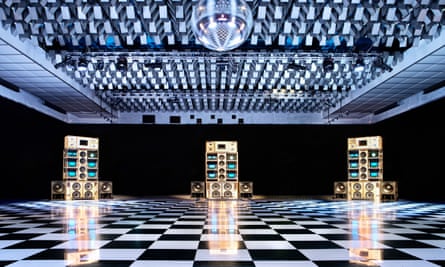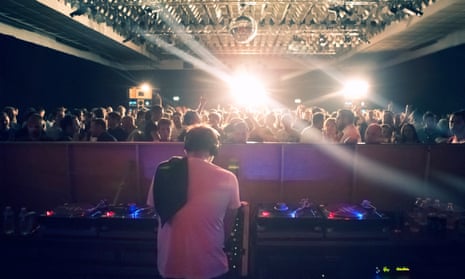James Murphy is bleary-eyed as he welcomes David and Stephen Dewaele – the Belgian brothers behind Soulwax and 2manydjs – into his Brooklyn home. Jetlagged from a recent flight back from South America, where his band LCD Soundsystem just wrapped another leg on their world tour, he’s already looking forward to the next party: when all three play together, it’s Despacio (Spanish for “slow”), an event unlike any other.
“Certain elements are like a house party, where people hang out, but they really go for it later, like a rave,” says Murphy. “People actually dance instead of staring at a DJ and waiting for drops. And it doesn’t hurt your ears.”
Which it could easily do, with a sound system powerful enough to cause hearing damage. Having been staged in London, Coachella and New York City and coming back to London this weekend, Despacio is a movable feast, although one that weighs 30,000kg, thanks to its intricately designed system of eight stacks of McIntosh speakers and amps. “Despacio is significantly heavier than the front-of-house PA for an arena tour,” says Murphy. “When Metallica is playing for 70,000-capacity football stadiums, that PA is lighter than Despacio. It’s physically larger, but Despacio is heavier.”
Murphy and the Dewaeles can’t quite agree on when they met in the haze of the early-00s electroclash era, but Despacio arose from one of Murphy’s ever-present notebooks, which Stephen recalled featuring prototype designs and queries such as: “Why don’t we make our own tour bus?”, “Why don’t we make our own DJ bag?” or “How about we make our own mixer?” Their ideal sound system was imaginary and theoretical for the most part (although Precious Hall in Sapporo, Japan, and clubs in Tokyo proved inspirational), until Murphy decided to build it himself. “The biggest difference between me and someone else is, they go: ‘I don’t know how to do it’ and I go: ‘I also don’t know how to do it, but I’m sure it’ll be fine,’” he says.

Despacio, with its tracks often slowed down to a sensual strut, also stems from frustration at modern club setups and systems built to blast out hyper-compressed dance music. Soon Murphy and the Dewaeles had a simple rule: “If you play AC/DC’s Back in Black and it doesn’t sound fucking good on your sound system, then your system doesn’t sound good. Because that album sounds great.”
And Back in Black as well as any number of classic rock tunes (from Heart’s Magic Man to Queen’s Another One Bites the Dust) that you might have heard hundreds of times on the radio turn revelatory on the Despacio speakers, imparting a physicality and headiness that beggars belief. It’s also a neat trick to make a generation of young dance music fans raise their hands skyward and go crazy for a 40-year-old guitar solo.
Since Murphy and the Dewaeles grew up playing in bands and were at the fore of getting indie rock kids to dance music, they have a special vantage on the state of EDM and bear some of the responsibility for making club nights overly emphasise the DJ. “As former band people, we would get rock fans out looking to see a show, so we had a visual thing, someone to look at and it was kinda funny at the start,” Murphy said. “But then DJ culture became weaponised elevator music.”
Instead, Despacio went against trends. “The people waiting for something really exciting to happen are going to leave,” he says. “And then once you get people going and they dance naturally – after they have stopped waiting for things – then you can have a party. It’s about being patient, where you subvert the crowd’s expectations.”
“Despacio is the antidote for that world of EDM,” says Stephen. “The idea between the three of us was: ‘What if we could play that one crazy record?’ It’s like making your own secret stereo.” But for every Despacio that does happen, Stephen and David say there are another 20 or 30 that don’t, due to finances (they decline all alcohol and beverage sponsorships), hectic schedules or other extenuating circumstances. One party, all but set for a museum in the Dewaeles’ hometown of Ghent, fell through at the last minute because, according to Stephen: “It turned out the Ghent Altarpiece – the Lamb of God triptych – was being refurbished in the room next door. And the insurance policy had a polygraph that looks for movement and tremors, so there was no way we could do it because of the seismic activity.”
So when Despacio finally goes down, it’s all the sweeter. As Murphy says: “We’re lucky enough to realise that we’re lucky. It’s a miraculous thing to get away with.”
Five key Despacio tracks
Steve Reich: Music for 18 Musicians (1978)
James: “Despacio is about getting to that right vibe for the party from the beginning. None of us are trying to get their ‘moment’. We can just play the weirdest shit, like this as an opening track.”
Paranoid London: Transmission Five (2013)
Stephen: “We play it slowed down and were like: ‘Fucking hell!’ We thought we didn’t know these guys, but it turned out we knew them from the 303 Club in London. And they heard it one night on the sound system and were like: ‘Arrrrrgh!’”
Steve Miller Band: Fly Like an Eagle (1976)
James: “That’s a motherfucker of a track on that sound system. Play it on a modern dance sound system and it would sound terrible.”
Mr Oizo: Flat Beat (1999)
James: “Slowing down the records decreases expectations and anxiety for everybody.” Stephen: “And it’s a physical experience, getting that much more low end on tracks like Mr Oizo.”
Dennis Parker: Like An Eagle (1979)
Stephen: “We take this disco classic and slow it down to -12 and there’s this moment of the song right at the chorus [all three sing in a slow drunken warble] and it just makes everybody happy.”
- Despacio appears at All Points East festival, Victoria Park, London, 25-27 May

Comments (…)
Sign in or create your Guardian account to join the discussion